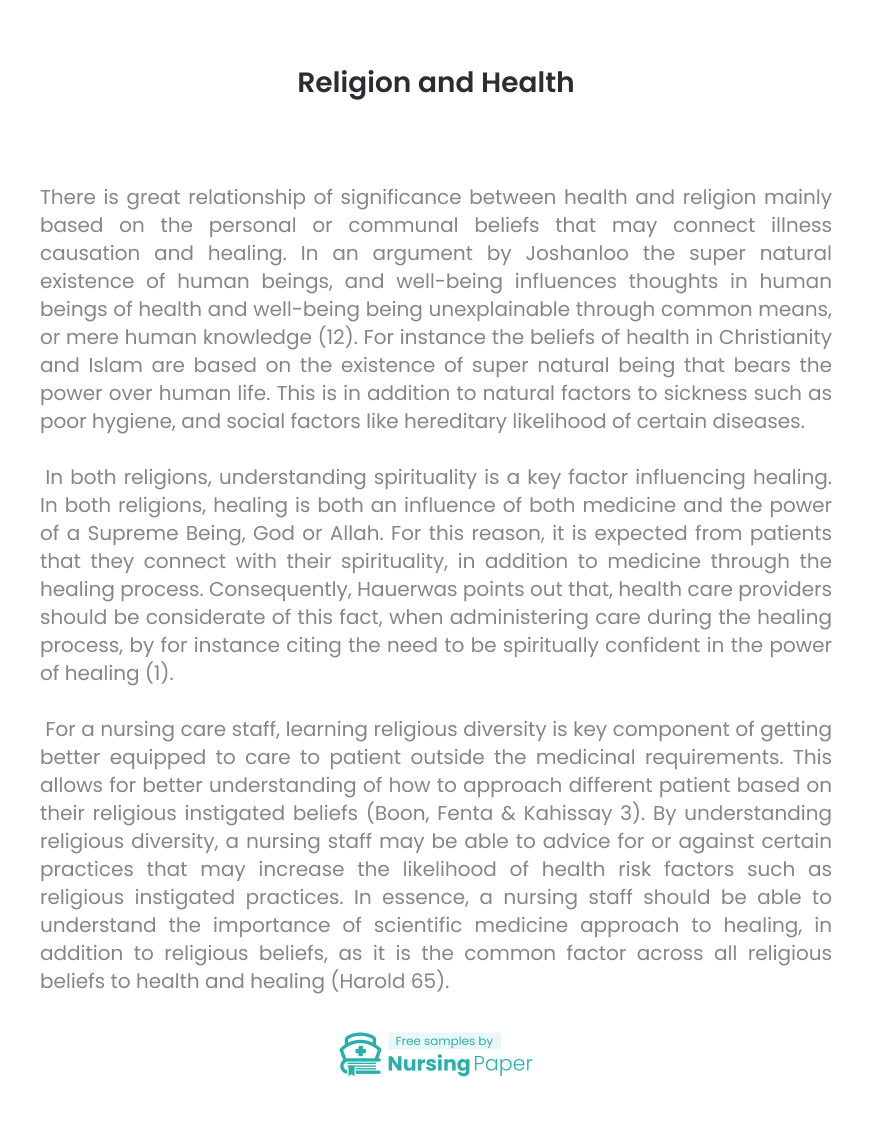
Religion and Health
Introduction
There is great relationship of significance between health and religion mainly based on the personal or communal beliefs that may connect illness causation and healing. In an argument by Joshanloo the super natural existence of human beings, and well-being influences thoughts in human beings of health and well-being being unexplainable through common means, or mere human knowledge (12). For instance the beliefs of health in Christianity and Islam are based on the existence of super natural being that bears the power over human life. This is in addition to natural factors to sickness such as poor hygiene, and social factors like hereditary likelihood of certain diseases.
In both religions, understanding spirituality is a key factor influencing healing. In both religions, healing is both an influence of both medicine and the power of a Supreme Being, God or Allah. For this reason, it is expected from patients that they connect with their spirituality, in addition to medicine through the healing process. Consequently, Hauerwas points out that, health care providers should be considerate of this fact, when administering care during the healing process, by for instance citing the need to be spiritually confident in the power of healing (1).


For a nursing care staff, learning religious diversity is key component of getting better equipped to care to patient outside the medicinal requirements. This allows for better understanding of how to approach different patient based on their religious instigated beliefs (Boon, Fenta & Kahissay 3). By understanding religious diversity, a nursing staff may be able to advice for or against certain practices that may increase the likelihood of health risk factors such as religious instigated practices. In essence, a nursing staff should be able to understand the importance of scientific medicine approach to healing, in addition to religious beliefs, as it is the common factor across all religious beliefs to health and healing (Harold 65).
1. Boon, Heather., Fenta, Teferi. And Kahissay, Mesfin. Beliefs and perception of ill-health causation: a socio-cultural qualitative study in rural North-Eastern Ethiopia. BMC Public Health, 2017, 17: 124.
2. Harold, George. Medicine, Religion, and Health: Where Science and Spirituality Meet. Pennsylvania. Templeton Foundation Press. 2008. Print.
3. Hauerwas, Stanley. Health and Healing: The Difference Christianity Makes. Web. 14th Oct, 2015. http://www.abc.net.au/religion/articles/2015/10/14/4331740.htm
4. Joshanloo, Mohsen. “Religiosity moderates the relationship between negative affect and life satisfaction: A study in 29 European countries”. Journal of Research in Personality, 2016, 61: 11–14.



The download will start shortly.

The download will start shortly.
 Subject:
Health and Social Care
Subject:
Health and Social Care  Number of pages: 5
Number of pages: 5  Subject:
Nursing
Subject:
Nursing  Number of pages: 3
Number of pages: 3  Subject:
Health and Social Care
Subject:
Health and Social Care  Number of pages: 6
Number of pages: 6  Subject:
Health and Social Care
Subject:
Health and Social Care  Number of pages: 3
Number of pages: 3  Subject:
Health and Social Care
Subject:
Health and Social Care  Number of pages: 2
Number of pages: 2  Subject:
Health and Social Care
Subject:
Health and Social Care  Number of pages: 2
Number of pages: 2  Subject:
Health and Social Care
Subject:
Health and Social Care  Number of pages: 4
Number of pages: 4  Subject:
Health and Social Care
Subject:
Health and Social Care  Number of pages: 3
Number of pages: 3  Subject:
Medicine
Subject:
Medicine  Number of pages: 5
Number of pages: 5  Subject:
Nursing
Subject:
Nursing  Number of pages: 5
Number of pages: 5  Subject:
Nursing
Subject:
Nursing  Number of pages: 7
Number of pages: 7  Subject:
Health and Social Care
Subject:
Health and Social Care  Number of pages: 2
Number of pages: 2  Subject:
Nursing
Subject:
Nursing  Number of pages: 3
Number of pages: 3  Subject:
Health and Social Care
Subject:
Health and Social Care  Number of pages: 3
Number of pages: 3  Subject:
Medicine
Subject:
Medicine  Number of pages: 3
Number of pages: 3 
